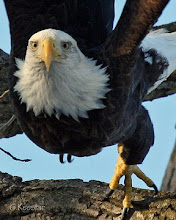


Eyesight
All eagles are renowned for their excellent eyesight, and the bald eagle is
no exception. They have two foveae or centers of focus, that allow the birds to
see both forward and to the side at the same time. Bald eagles are capable of
seeing fish in the water from several hundred feet above, while soaring,
gliding or in flapping flight. This is quite an extraordinary feat, since most
fish are counter-shaded, meaning they are darker on top and thus harder to see
from above. Fishermen can confirm how difficult it is to see a fish just
beneath the surface of the water from only a short distance away.
Young bald eagles have been known to make mistakes, such as attacking
objects like plastic bottles floating on or just below the surface of the
water. Bald eagles will locate and catch dead fish much more rapidly and
efficiently than live fish, because dead fish float with their light underside
up, making them easier to see.
Eagles have eyelids that close during sleep. For blinking, they also have an
inner eyelid called a nictitating membrane. Every three or four seconds, the
nictitating membrane slides across the eye from front to back, wiping dirt and
dust from the cornea. Because the membrane is translucent, the eagle can see
even while it is over the eye.
Eagles, like all birds, have color vision. An eagle's eye is almost as large
as a human's, but its sharpness is at least four times that of a person with
perfect vision. The eagle can probably identify a rabbit moving almost a mile
away. That means that an eagle flying at an altitude of 1000 feet over open
country could spot prey over an area of almost 3 square miles from a fixed
position.
above info from: http://www.baldeagleinfo.com/eagle/eagle2.html
We've all heard people use the phrase "eagle eye," and there is good reason -
eagles have exceptional eyesight.
Bald eagles have eyesight estimated to be four times sharper than humans. They
also have dual-focus ability - meaning they can focus their eyes on an object
ahead of them and another on the side at the same time.
No one knows why, but like many raptors, the iris of the bald eagle starts out
dark brown, and turns bright yellow by the time the bird matures sexually, at 4
to 5 years of age. Their adult eye color is almost identical to the color of
the bill.
Eagles' daytime eyesight is excellent. However, experts say their nighttime
eyesight and hearing is about the same as ours, and their senses of taste and
smell are poor.
Above info from
http://www.cvps.com/eagles/eyesight.shtml
Web cam updates:
Norfolk is up and running: Well sort of anyway. Post this evening says they are performing final test, and will be up soon for good.
A very short video can be seen here:
Daily slideshows can be seen here...Bookmark this I bet this will be awesome
Pelican Harbor continues to work hard with nestorations: Cute video of this pair here:
They have also had a visit from a 3 or 4 year old immature see juvie video here
Blackwater also reports immatures visiting the nest on more than one occasion.

Tesoro
Hatch there hopefully is imminent. The
chairback eggspertshave a variety of dates from Jan 9 til Jan 11 as earliest possible hatch.

Cape Coral 1 Has at least 2 little eaglets.

It also appears that Cape Coral 2 has had a hatch

NCTC Has talk of getting their video underway soon.


For those who have the time and enjoy watching 600 eagles soar I made a couple of videos of my last trip to Fulton on January 4th. It was a cold windy but sunny day. I got there quite early in the morning and the eagles were very active.
A short 3 min video is here.
The longer 5 minute video is here.


5 comments:
Glo, This was one of the best yet. I wonder if our eagle-eyed sharon knows how good her vision is?
Such a pretty sight and sweet music to boot...Glo, did I see a Golden Eagle flying above the water near the end of the video?
Hi Wanda. Gosh to be honest I really can't say for sure there was no Golden eagle in this footage, but I highly doubt that there was. Immatures look a lot like golden eagles. I have also read that Golden Eagles do not feed primarily on fish and with the skilled fishing of the Bald and their numbers I don't think they would be around where Balds were fishing. I could certainly be wrong. This would be a question for the experts on both birds is my guess.
Thanks so much for a wonderful post! I really appreciate your efforts in putting together these updates from the eagle cam world. Obviously this is a labor of love for you and I, for one, appreciate it immensely!
Great nest update and info on the BE's eye function, Glo. Thanks a million.
I'll have to check the videos later.
Jim
Post a Comment